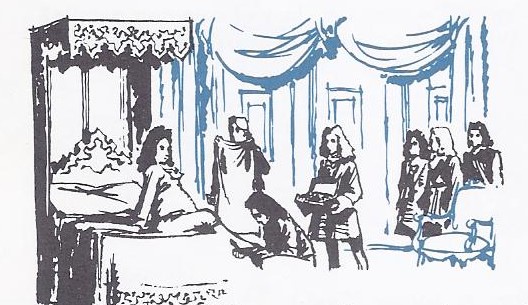From early morning until midnight every great French noble and those who hoped to be great, worked at doing and saying what would please the King in his palace at Versailles. From all over France came these noblemen, for the only road to success was by way of the Grand Monarch’s favour. In 1670 a French bishop described the tremendous power of the King in these words: “Behold an immense people united in a single person; . . you see the image of God in the King, and you have the idea of royal majesty . . . borrowed from God, who gives it to him for the good of the people.”
So the nobles flocked to Versailles to see and — much more importantly — to be seen and known by the King. These courtiers, or nobles at the court, had no easy time carrying out the endless ceremonies at Versailles. The following account gives you a picture of what courtiers had to do.
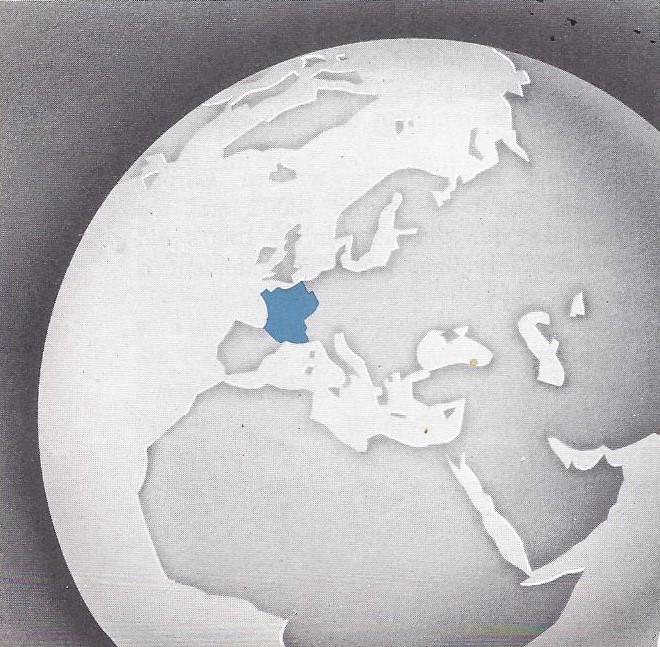
The courtier was obliged to leave his bed for the icy corridors of Versailles at a very early hour. He then attended the King at Mass, at his dinner, his walk, his supper at ten, his going to bed at midnight and whenever he changed his boots and coat, as well as at any entertainments which happened to be taking place.
The ceremonies of the King’s rising involved the attendance of 150 or 200 people. Long before eight o’clock the anteroom was filled with a whispering crowd studying requests they had to make. As the clock struck, the valet in chief entered the King’s bedroom and pulled up the gold and white blinds . . . When the King was fully roused, there filed in a brilliant assembly of the princes of the blood [those related to the king]. A few moments later took place the arrival of the great lords. At this point the King got out of bed and sat on the edge of it, while his dressing gown was hung over him and his slippers were put on his feet. . . . The King’s shirt was now fetched and water was brought to him to wash his hands and perhaps his face. The shirt was presented by the chief person present and a like ceremony attended the putting on of other garments. The King chose his cravat pin from a number presented to him on a tray. His wig was selected from a large collection under glass in a neighbouring closet. Every two days the King was shaved. Finally the doors were thrown open and the rest of the waiting throng streamed in and lined the walls.
The watchmaker then entered to wind up the royal watch and the chaplain proceeded to say a prayer, while the King knelt on his prayer stool. When the assembly had gone to the King’s Mass, the royal upholsterers made the bed and the Valet sat all day . . . to guard it. All who passed were obliged to bow or curtsey to it.
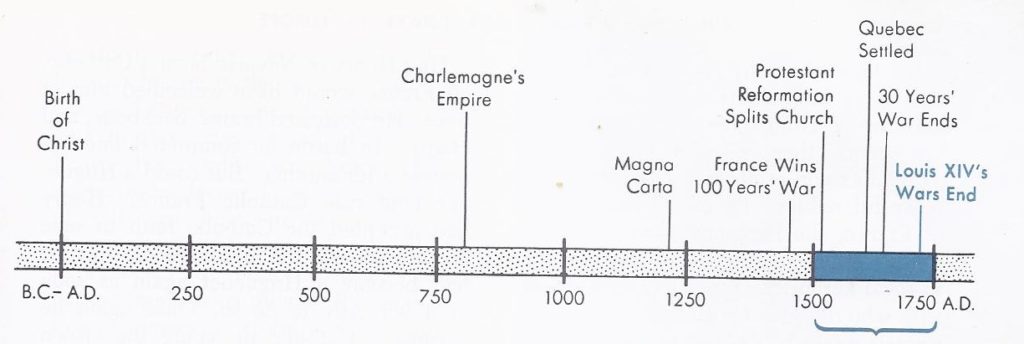
In France kingly power reached its height under Louis XIV, also called “Louis the Great” and the “Sun King” by his courtiers. The brilliance of his court and the extent of his authority far exceeded those of earlier French monarchs. France as a nation grew more powerful at the same time. In the following we will discover answers to these questions:
1. What conditions helped to unite France?
2. How did Louis XIV build up his power in France?
3 What foreign policies did Louis XIV follow?
4. How did the increasing power of French kings affect the French people?
1. What Conditions Helped to Unite France?
Royal power in France grew slowly. You have already learned that during the 1200’s and 1300’s certain kings drew France together by limiting the power of the nobles. The Hundred Years’ War not only interrupted these efforts but seriously weakened France. At the end of the war, however, French rulers once more began to assert their power, both within France and in the affairs of Europe.
France suffered from religious and civil wars. During the late 1500’s France again suffered troubled times. In part the disturbances grew out of the struggle for power between rival noble families, in part out of religious differences. France, you remember, was to a great extent a Catholic country. Some Frenchmen, however, had accepted Martin Luther’s ideas and even more French Protestants were followers of John Calvin.
In time French Protestants became known as Huguenots. The number of Huguenots was never large, but among them were many influential merchants and craftsmen as well as some powerful nobles. To the Catholic rulers of France, the Huguenots were not only a troublesome religious group but a threat to royal authority. Kings feared that subjects who disagreed with them in religious matters might be disloyal to them in other ways. In 1572 a terrible massacre of Huguenots occurred. More than 3000 men, women and children were killed in Paris alone; and a still larger number elsewhere in France. Such religious persecutions were a part of Civil wars that disturbed France over a period of many years.
Henry of Navarre became King of France. Disorder in France came to a head in a three-cornered struggle sometimes called the War of the Three Henrys. This war was fought between King Henry III, a Catholic; Henry, Duke of Guise, another Catholic; and Henry of Navarre, the leader of the Huguenots. The Duke of Guise was murdered by the King and later the King himself was assassinated. Henry of Navarre belonged to the Bourbons, a younger branch of the royal family, he had the best claim to the French throne.
TIMETABLE
RULERS OF FRANCE (1589-1715)
Henry IV (Henry of Navarre), 1589-1610
Proclaimed Edict of Nantes, 1598
Louis XIII, 1610-1643
With advice of Cardinal Richelieu, made France more powerful.
Louis XIV, 1643-1715
Advised by Cardinal Mazarin, 1643-1661
Made the royal power absolute 1661-I715
Revoked the Edict of Nantes, 1685
(For Louis’ foreign wars, see table on page 331.)
Had Henry of Navarre been a Catholic, all France would have welcomed him at once. He possessed brains, backbone and charm. In battle he conquered one opponent after another. However, could a Huguenot king rule Catholic France? Henry had accepted the Catholic faith to save his life during the persecutions, but he had become a Huguenot again as soon as it was safe to do so. Once again he became a Catholic to secure the crown of France. Henry of Navarre was now known as Henry IV, the first of the Bourbon family to be King of France.
Henry IV faced serious problems. You may think it odd that Henry slipped his religious “beliefs” on and off like an overcoat, to fit changing political and religious weather. Yet Henry IV was in many ways the best king that France had had since the days of St. Louis. Henry found the country in fearful disorder. Weak rulers had let nobles regain great power. Judges could be bribed, so there was not much real justice. There was so little patriotism that Huguenots had allied themselves with England and French Catholics with Spain, to wage war against their own country. What France needed was (1) an end to religious quarrels, (2) an end to civil wars and (3) a return to prosperity. King Henry and his wise and able Huguenot statesman, the Duke of Sully, set out to achieve these goals.
The Edict of Nantes granted security to the Huguenots. The first step Henry took was to safeguard the rights of the Huguenots. A royal order, called the Edict of Nantes, was published in 1598. The Edict of Nantes gave the French Protestants freedom of worship and the right to hold public office. It also granted them control of certain walled towns and castles, so that they could protect themselves in case of future persecutions.
Henry IV and Sully brought prosperity to France. King Henry IV once said that his chief aim was not conquest or glory but to rule so that “every peasant should have a chicken in the pot for Sunday dinner.” Of course, only a few French peasants in those days could afford such a luxury, but conditions in France did improve under Henry IV. The honest Duke of Sully cut down on the cheating and abuses practiced by so many tax collectors in France. He reduced waste, extravagance, and corruption. By managing France’s finances carefully, Sully was able to set aside enough cash from taxes to reduce the heavy government debt and at the same time, to develop a strong standing army. He also raised money to drain swamps and to build roads, bridges and canals. As a result of such policies, both peasants and businessmen became more prosperous.
Besides improving conditions in France, Henry IV and Sully checked the growing might of the Hapsburg rulers of Austria and Spain. They even talked of a sort of League of Nations to preserve peace among the great powers of Europe. But in 1610, after an all-too-brief reign, Henry IV was murdered.
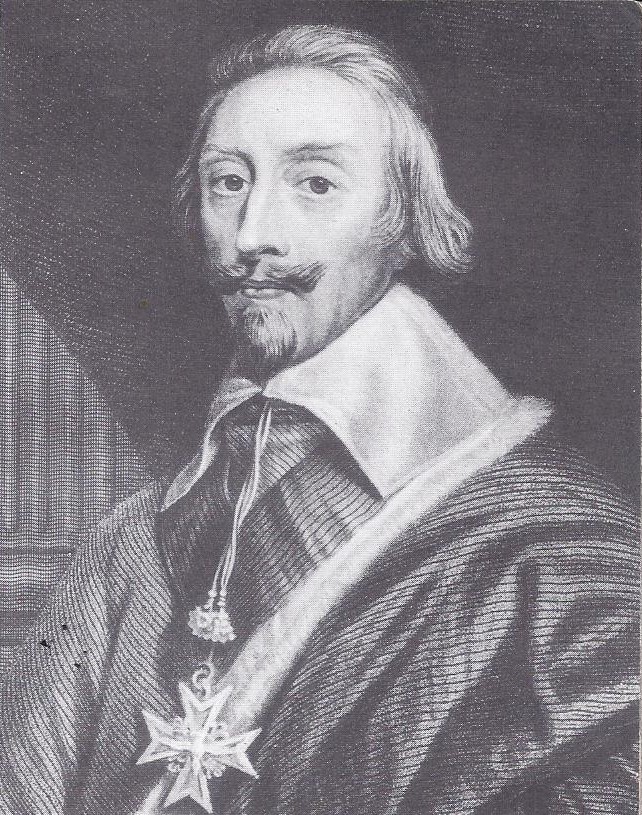
Cardinal Richelieu became the real power in France. King Louis XIII, Henry’s son, was only nine years old when his father died. It is not strange, therefore, that as the young boy grew up he became used to following the advice of others. Most important among his advisers was the man who became his chief minister, Richelieu. Cardinal Richelieu came into power in 1624. To Richelieu goes credit for the fact that, after the death of Henry IV, France suffered only a brief period of weakness and lack of unity.
Richelieu ruthlessly advanced the power of the king. Richelieu’s aim was twofold: (1) to make his king supreme in France; (2) to make France supreme in Europe. Shrewd and clever, Richelieu set about reaching his aim by any means at hand.
The most serious threat to royal power still came from the nobles. Although not as powerful as they once had been, they continued to possess vast lands, enjoy special privileges and hold high offices in the army and in the king’s service. On their own estates they often acted as tyrants toward their serfs and even toward the free peasants.
Richelieu, however, had spies everywhere and he did not hesitate to put in jail or even to execute nobles who resisted the king’s authority. Furthermore, he depended more and more on members of the middle class rather than on nobles to perform important services in the government. As for the States-General, the lawmaking body about which we read, Richelieu simply ignored it. He never even called it together. Though Richelieu compelled the law courts to accept the king’s decrees as law, he also insisted that justice be given. So well did the stern Cardinal succeed in this matter that King Louis XIII (who personally had little to do with it) was sometimes called “Louis the Just.” Finally, Richelieu took away from the Huguenots their fortified towns and political privileges, though he wisely left them their freedom to worship as they pleased.
Richelieu made France a great European power. We have already learned how Richelieu made France the ally of Sweden in aiding the German Protestants during the Thirty Years’ War. The great Cardinal believed that the Hapsburg rulers of Austria and Spain were the chief enemies of France. His policy was to do anything he could to weaken these foes that hemmed in his beloved France. Backed up by Louis XIII, Richelieu made France the strongest kingdom in Europe.
A new king and a new cardinal came into power. Louis XIII died in 1643, just a year after Richelieu. Once again a small boy became king, for Louis XIV was only five when he began his long reign of 72 years. Once again a strong man was ready to rule for a boy king. This was Cardinal Mazarin, who carried on the task, which Richelieu had started, of building up the power of the French king. Mazarin continued the wars with the Austrian and Spanish Hapsburgs and won new territory for France. In France itself he put down a revolt of discontented nobles and some of the middle class who felt they were paying too much in taxes. When Mazarin died, he left Louis XIV absolute ruler of France and the chief monarch of Europe.
2. How did Louis XIV Build Up His Power in France?
Louis XIV insisted on being sole ruler of France. When Mazarin died, the still youthful Louis XIV called the chief officials of the government together. To them he said:
Until now I have been willing to let my affairs be managed by the late Cardinal; it is now time that I managed them myself. You will assist me with your advice when I ask you for it . . . sign nothing, not even a letter of protection or a passport without my command . .. . render your accounts to me personally each day; and . . . show favour to no one in your monthly reports. . . . In the government of my realm, in the regulation of my finances, and in my dealings with foreign powers, I shall have other principles than those of the late Cardinal. You know my wishes, gentlemen: It now remains for you to execute them.
By these words Louis XIV indicated that he would be the real ruler of France and such he certainly became. It was Louis’ belief that God had singled him out from among all men to rule France and Louis would share that rule with no one.
Few people in France worked harder than did the King. Yet he found time to take part in such formal court ceremonies as we have read about. Louis XIV believed that the nation should take great pride in its king and that elaborate court ceremonies helped to give the ruler added importance in the eyes of other peoples.
Louis XIV possessed kingly qualities. Louis sincerely believed himself to be the greatest and most important person in Europe. Though he was not actually as great a ruler as he thought himself, or as the dazzled people of Europe then considered him to be, Louis had some very strong qualities. For one thing, the Grand Monarch, as Louis was often called, looked like a king. Few kings look like kings or would be chosen by a motion picture director to play a royal role, but Hollywood would have picked Louis for the part at once. Though rather short, he was stately and dignified. He rarely lost his temper, but he could wither a servant or a courtier by merely raising an eyebrow.
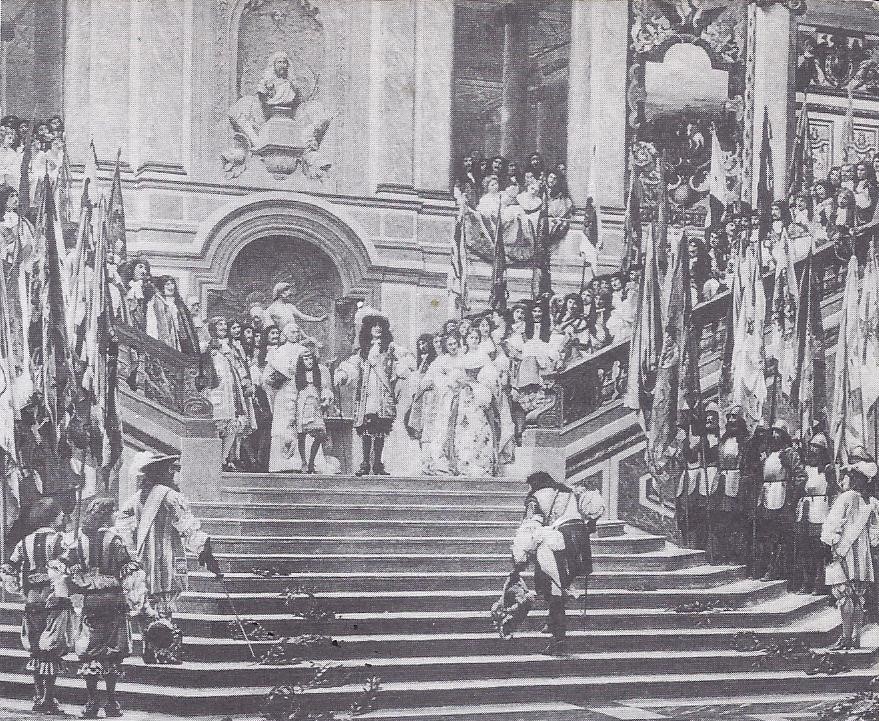
Moreover, Louis had a sense of humour that sometimes tried his courtiers. Once he asked a nobleman for an opinion of a short poem, saying that he himself thought it of poor quality. The nobleman, of course, hastily agreed with the King, never dreaming that the King himself had written it. “And is it not true that the persen who wrote it must be a great fool?” asked the King. Again the noble quickly agreed. The King then said, “I am delighted that you have spoken so plainly about it, because I am the author of it.” The frightened courtier then answered, “Ah, Sire, what treason! I beseech your Majesty to give it back to me – I read it hastily.”
Many such “yes men” surrounded the King and he must have found it difficult to get an honest opinion from his advisers. Yet Louis had that quality which is important in any leader — he knew how to find able men to serve him and France.
Louis XIV drew the nobles to his court. As did previous kings, Louis found the French nobles the chief threat to his power. He therefore took highly successful steps to build up royal authority. Louis did not seek to destroy the nobles or to take away their wealth or their privileges; he simply encouraged them to seek a career at his court. No longer did noblemen lord it over humble peasants and shopkeepers in the country villages, where they saw no one as great as themselves. Instead, noblemen now counted it an honour, to hand the King his shirt in the morning or buckle the spurs onto his royal boots.
If any noble was foolish enough to stay away from court, he could not hope for favours from Louis. When anyone not belonging to his group of courtiers sought a position in the government, the King would say, “I do not know him.” Those words would put a quick end to the man’s hopes.
Versailles was a fitting palace for the Grand Monarch. The old palaces in Paris were not good enough for Louis XIV. Any king who turned his courtiers into valets naturally wanted a magnificent palace. Furthermore, Louis was fond of hunting, especially in the forest near the village of Versailles a few miles from Paris. So at Versailles Louis built the greatest palace in the world. The palace of Versailles, which has been the scene of many historic events, still stands today, a reminder of Louis XIV’s splendour. Visitors to France flock to it by the thousands each year. Though surrounded by beautiful gardens, the outside of the palace is almost plain. Inside, however, it is magnificent, with its mirrors and glittering chandeliers, its walls of marble and its tall windows hung with costly silk curtains.
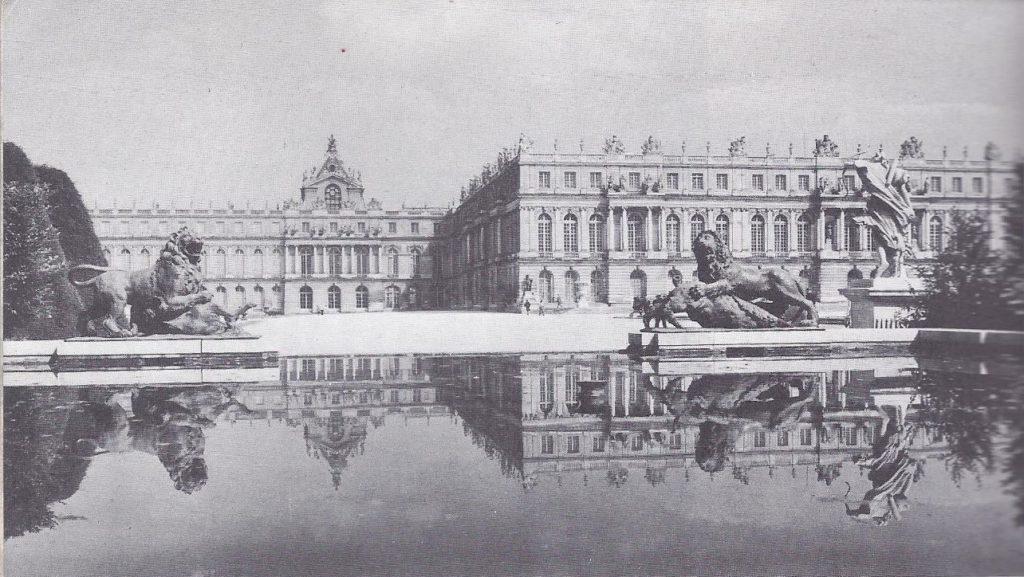
Louis’ court was copied by other monarchs. The Grand Monarch of France and his court became models for the other rulers of Europe. Nearly all of them tried to copy the splendours of Versailles, though they always failed, from lack either of money or of taste. Other features too of Louis’ court were widely copied. French became the international language of statesmen and of cooks — even today the menus in many restaurants (menu and restaurant are both words of French origin) are in French. French became the language of polite conversation among Europeans who considered themselves ladies and gentlemen. French furniture, china and tapestry became the style for all Europe. French dancing masters and fencing masters taught their arts in England and in Germany. French manners became the correct manners for all Europe. Writers in other countries imitated French authors and playwrights. In short, the fashionable way was the French way.
The arts flourished during the Age of Louis XIV. During the reign of Louis XIV great pictures were painted, splendid buildings were erected and important books were written. Not only did the King have a very real interest in such things. He realized that his own fame would be increased by gathering about him a brilliant group of artists, writers and men of learning. If you study French, you may someday read a play by Moliére, Racine, or Corneille, all famous playwrights of that day. French paintings, sculpture, buildings and books of the Age of Louis XIV are better known for following set rules gracefully than they are for new ideas. In this respect they resemble the work of the later Romans.
In many ways France prospered under King Louis XIV. Louis was too wise to neglect France’s financial welfare. To be sure, the peasants were miserably poor and unjustly taxed. Yet there was considerable wealth in France even though it was held by not very many people. The fact that France survived the long series of wars that were waged during Louis’ reign is proof that the country’s resources were great.
In financial matters, Louis sought the help of an expert. Colbert, Louis’ able director of finance, made a great contribution to France’s prosperity. He improved the methods of collecting taxes and spent government money wisely. He built good roads and canals and introduced improvements in agriculture. Under Colbert’s guidance the government promoted trade, business and farming. Craftsmen from other countries were encouraged to settle in France and teach their craft to Frenchmen. As a result, the production of luxury articles such as silks, lace and tapestries boomed. Only England and Holland could be compared with France in manufacturing and in trade. Unfortunately for France, however, Louis’ wars eventually drained off much of the wealth that Colbert’s program had created.
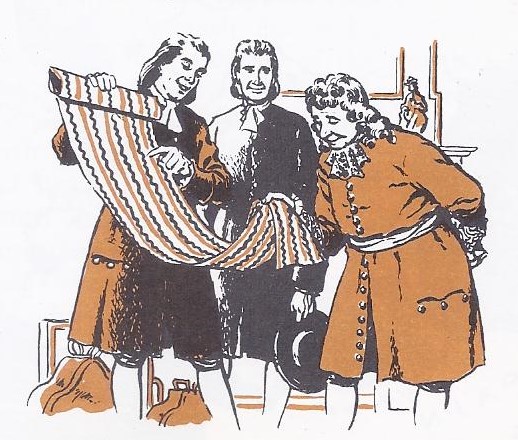
Religious intolerance injured French prosperity. Louis’ policy toward the Huguenets also cost France dearly. In 1685 Louis cancelled the Edict of Nantes, thereby ending almost a century of religious freedom for the Huguenots. Some 200,000 Huguenots left France, carrying with them of course their skill in manufacture. (Many of the best French craftsmen were Huguenots.) Some went to England, some to Holland, some to Germany; others to Dutch South Africa. Still others settled in the British colonies in North America. Thousands of American citizens today are among the descendants of these Frenchmen who were persecuted because their religious views differed from those of their king.
3. What Foreign Policies Did Louis XIV Follow?
Louis XIV sought land and glory. In Louis’ time monarchs seldom hesitated to plunge their countries into war. Louis XIV possessed no great military skill himself, but he had many able generals and the best army in Europe. Should he use this well trained and equipped force of 200,000 to gain territory for France? If so, in what direction should he expand? To the first question Louis would have replied, “Of course!” To the second, geography furnished the answer.
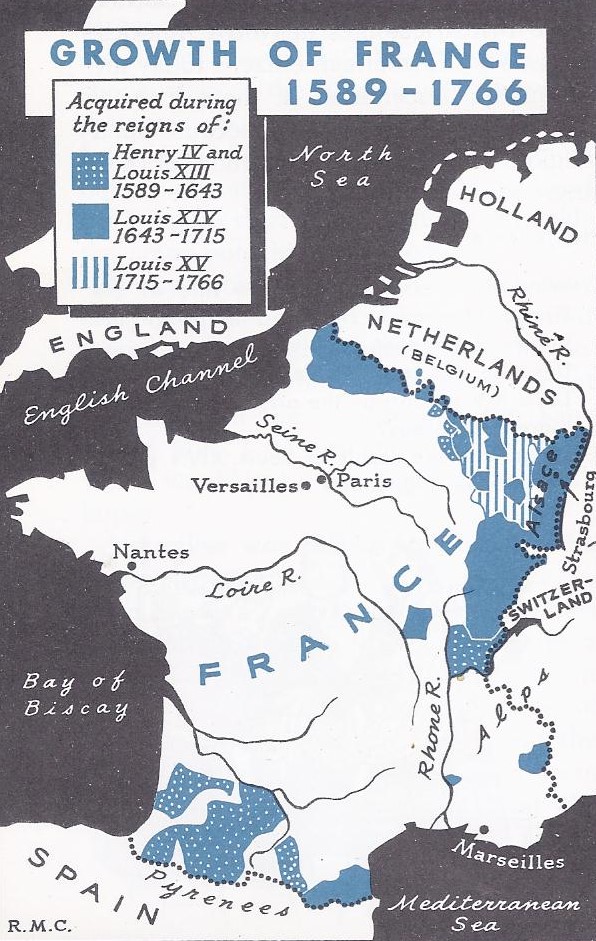
On the north and west, France was surrounded by water. The Pyrenees Mountains, the Mediterranean Sea and the Alps supplied southern France with natural boundaries. On the east, north of the Alps, there was no such boundary. Louis XIV believed that France should acquire the land to the northeast as far as the Rhine River. To satisfy this ambition Louis would have to seize lands ruled by German princes and the Hapsburgs. Much of this territory seemed too weakly defended to resist the French armies. What Louis XIV failed to realize was that other European states would not stand by idly and allow France to upset the balance of power.
Louis XIV undertook wars of conquest in Holland and Germany. In all, Louis XIV led France into four wars between 1667 and 1713. He started the first when he invaded what is now Belgium, claiming that he was the rightful ruler of these “Spanish Netherlands.” Louis won only a few towns along the border. The English, the Dutch and the Swedes all intervened. Louis was not ready to fight so many enemies at one time.
The fact that the Dutch had dared to oppose him angered Louis XIV, so in 1672 he struck at Holland without warning. The Dutch were ably led by William of Orange, a member of the same family as William the Silent. They fought back stubbornly and opened the dikes holding back the waters of the North Sea. By thus flooding their lowlands, the Dutch halted the French. When this futile war ended, France was little nearer than before to the Rhine River line that Louis wanted.
Louis now changed his tactics. He put lawyers to work to uncover old, forgotten land claims. Then he sent his forces to take over cities on the border of Germany, arguing that they belonged to him by right of inheritance. This action was taken at a time when France was supposedly at peace!
At length a number of countries, including Spain, Holland, the Holy Roman Empire and Sweden, formed an alliance to Check Louis’ highhanded actions. This alliance was called the League of Augsburg. It so happened that about this time William of Orange, who had defended Holland against the Grand Monarch, became King of England, England promptly joined the League against Louis and a third war, known as the War of the League of Augsburg, broke out. At its close in 1697 France had to give up all the cities and towns it had seized except Strasbourg.
Events in Spain threatened the balance of power in Europe. Louis XIV might have refrained from further wars had he not been tempted by an even greater prize. During the last of the 1600’s, European statesmen were keeping watchful eyes on Spain. The Spanish Hapsburg king would not live much longer and had no child to succeed him. Who, then, would become the next king of Spain? Would he be a member of the Austrian Hapsburg family? If so, the combined Austrian and Spanish possessions would create an empire much like that ruled by Charles V. France would never agree to such a union, because it would threaten France’s national security. However, if a member of the French Bourbon family became ruler of Spain, France could control Spain, Belgium, half of Italy and the vast Spanish possessions in the New World. Of course, no nation but France would agree to that!
In brief, then, whether the crown of Spain went to the Bourbon family of France or to the Austrian Hapsburgs, a huge and powerful state would be created which would upset the balance of power in Europe. England, Holland and the smaller European countries understood this danger, so they made plans to divide Spain among the neighbouring states.
Louis’ greed brought about the War of the Spanish Succession. The dying Spanish king was aware of all this scheming. Naturally he wanted to prevent the Spanish Empire from being divided. So he drew up a will declaring his rightful successor to be Phllip, grandson of Louis XIV of France.
Louis knew that to accept this offer might plunge Europe into another war, but how could he neglect such a golden opportunity for power and glory, even if France could ill afford the cost of another war? So the Grand Monarch let his grandson become king of Spain with the title of Philip V. You can see why the war which resulted came to be called the War of the Spanish Succession.
TIMETABLE
WARS OF LOUIS XIV
War to gain Spanish Netherlands, 1667-1668
France opposed by Holland, England and Sweden. France gained a few border towns.
France against Holland, 1672-1678
Other states finally came to Holland’s aid. France gained Franche Comté from Spain.
War of The League of Augsburg, 1689-1697
France opposed by Holland, Holy Roman Empire, Sweden, Spain and England.
No important gains.
War of the Spanish Succession, 1701-1713
France and Spain against Holland, Britain, the Austrian Hapsburgs, some German states, Portugal and Savoy. Concluded by Treaty of Utrecht. France and Spain defeated. Austria gained Spanish Netherlands and territory in Italy. England received Gibraltar and Acadia (Nova Scotia).
A great alliance opposed France. The War of the Spanish Succession, which opened in 1701, was one of the greatest Wars of modern times. It was fought not only on the continent of Europe but in North America, where France and England were rivals. United against France were the Austrian Hapsburgs, the Dutch, the English and several small German states. Later, Portugal and the Italian state of Savoy also joined the alliance. The war dragged on for years, finally coming to a close in 1713 with a peace arranged in the Dutch city of Utrecht.
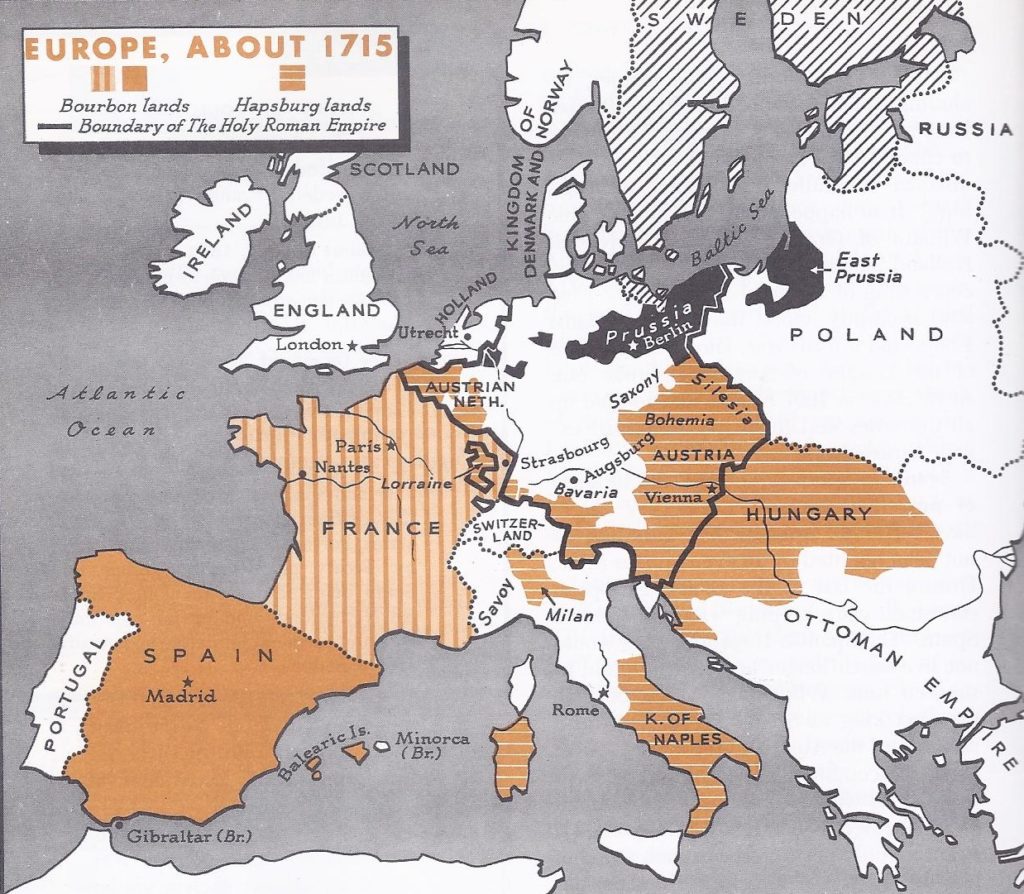
The Treaty of Utrecht brought peace in western Europe. The Treaty of Utrecht ended the Grand Monarch’s program of expansion; it also brought peace to western Europe for about 25 years. The following terms of settlement were agreed upon: (1) Louis’ grandson kept the throne of Spain, but it was agreed that the same person could not rule both Spain and France. In other words. Spain could be Bourbon but not French. (2) The rest of Spain’s possessions in Europe were divided. What had been known as the Spanish Netherlands went to the Austrian Hapsburgs, so it became known as the Austrian Netherlands. Portions of Italy were parceled out to the Austrian Hapsburgs and others — which helped to delay the formation of a united Italy. (3) The British made the greatest gains. They obtained the immensely valuable fortress of Gibraltar at the southern tip of Spain, as well as island bases for their ships. In the New World, France recognized the English claims to Newfoundland, Acadia (Nova Scotia) and the Hudson Bay region. England also received valuable trade rights from Spain.
The Grand Monarch left a weakened France. The reign of Louis XIV ended in 1715. He had held the throne longer than most people in those days lived. He had raised France to a leading position in Europe. His extravagance, his wars and his persecution of the Huguenots had also weakened the country. It may be that the dying King realized his mistakes, for the old man whispered to his little great-grandson, his only heir, “Do not imitate me in my love for war and for expensive building.” The advice was good, but the great grandson was then too young to rule. When Louis XV grew up, he apparently forgot his great-grandfather’s warning.
4. How Did the Increasing Power of French Kings Affect the French People?
France gained unity at the expense of liberty. National unity is an advantage unless it robs the people of their rights. Under absolute rulers like Louis XIV and his successors France achieved unity, but at a high price — the French people had little or nothing to say about their government. As the lawyers put it, “The will of the king is the, law of the land.” The nobles, the clergy and the townsmen were supposed to be represented in the States-General, but monarchs like Louis XIV called no meetings of that body. As for the French peasants, a writer of the 1600’s stated, “There is also a fourth class . . . the peasant; but he has nothing of importance to say.” In all respects, the French king and his officials ruled unchecked.
France suffered from misgovernment and inefficiency. France suffered in other ways too. The king was all-powerful, every important decision had to be referred to him, but even an energetic king like Louis XIV could not possibly attend to all the matters that needed to be considered. Government officials were often lazy and corrupt. As a result, after France became a strong monarchy certain abuses continued to plague the French people.
Government was not uniform in France. During the hundreds of years between the breakup of Charlemagne’s empire and the rise of the Bourbon kings, each part of France had developed its own laws. Local tolls for the right to cross bridges or use the roads interfered with commerce. There might even be a famine in one part of France and no way to get food there because of local regulations forbidding the export of grain. In fact there was a confusing mass of local customs and local laws. This situation provided a good living for lawyers but merchants and other people who needed to carry on business outside the part of the country where they lived found it difficult and expensive. The king, of course, had the authority to make laws and government uniform throughout France. Such a change, however, would have required a lot of work and would have been opposed by the people who had special privileges under the old system. So the king found it easier to let matters stand.
The French system of taxation was unjust. There was a great deal of property in France on which no taxes were paid. Church property was very extensive. The Church, instead of paying taxes, gave the state a “free gift” which was less than the tax would have been. Another large part of the land belonged to nobles. This land was taxed lightly because in earlier times the nobles and their men-at-arms had been expected to serve as soldiers of the king. Actually, nobles who never performed any military duty benefited from this tax exemption. So the bulk of the tax load fell on the common people.
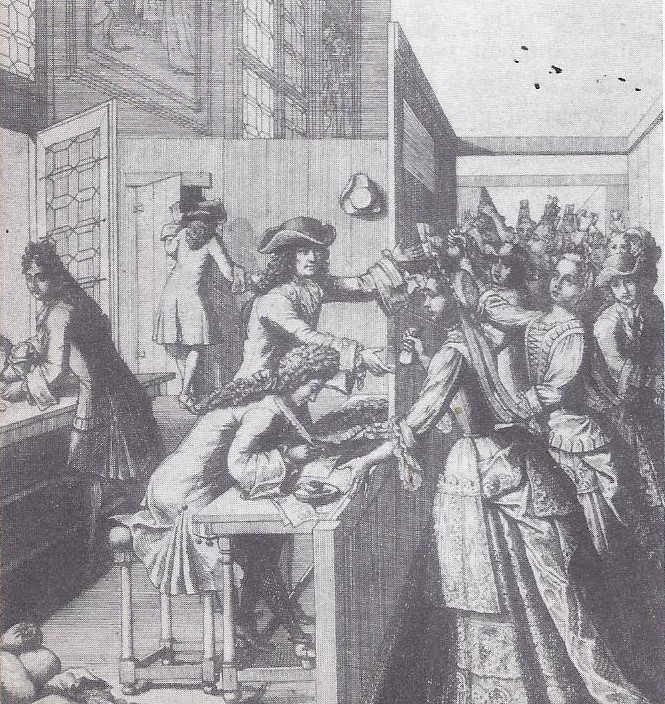
Many French peasants had to pay more than half of their annual income to the tax collectors. There were all sorts of taxes on property owned, on goods sold, on wages earned, as well as special taxes such as a tax on salt called the gabelle. However, the gabelle was heavier in some parts of France than in others, many people made money smuggling salt from one section of the country to another. For people who could not or would not pay their taxes on time, there was the “blue man.” He turned up at the homes or shops of tardy taxpayers and stayed there until the necessary sum was scraped together. He also presented his bill for the time he spent waiting!
The taille, as the tax on personal property was called, brought much misery. An old account written at the time says, “Everyone subject to the taille dreads to show his resources; he avoids any display of these in his furniture, in his dress, in his food and in everything open to another’s observation. . . . People work merely to satisfy their prime necessities. . . . ‘If I earned any more,’ says a peasant, ‘it would be for the collector!”
Taxes were often collected by “tax farmers.” Just as in ancient Rome, tax farmers were men who paid money to the government for the right to collect taxes. They received no wage for their work; instead, they tried to squeeze out of the taxpayers enough money to cover the sums to be paid to the government plus a profit for themselves. Such a system was an open invitation to get all they could.
What made the unjust tax situation still worse was the fact that the tax moneys turned over to the government, as well as other government funds, were spent at the king’s whim. Money needed for a new navy, for example, might be squandered on pensions for idle courtiers who hung about Versailles in an effort to win the king’s favour. The government was constantly in debt and borrowed large sums at high rates of interest.
Besides paying taxes to the government, peasants still had to pay dues, or rent, to their noble landlords just as in feudal times.
Laws concerning crime were cruel. Perhaps the greatest hardship suffered by the French people was the terrible injustice to persons falsely accused of crime. Due to the fact the accused could be tortured into confessing a crime he had not committed, many innocent people no doubt confessed guilt in order to escape torture. At the king’s order, anybody could be arrested and put in jail without trial. Worse still, the unfortunate person might be kept in prison as long as he lived and he might never know what he was accused of or what had become of his family.
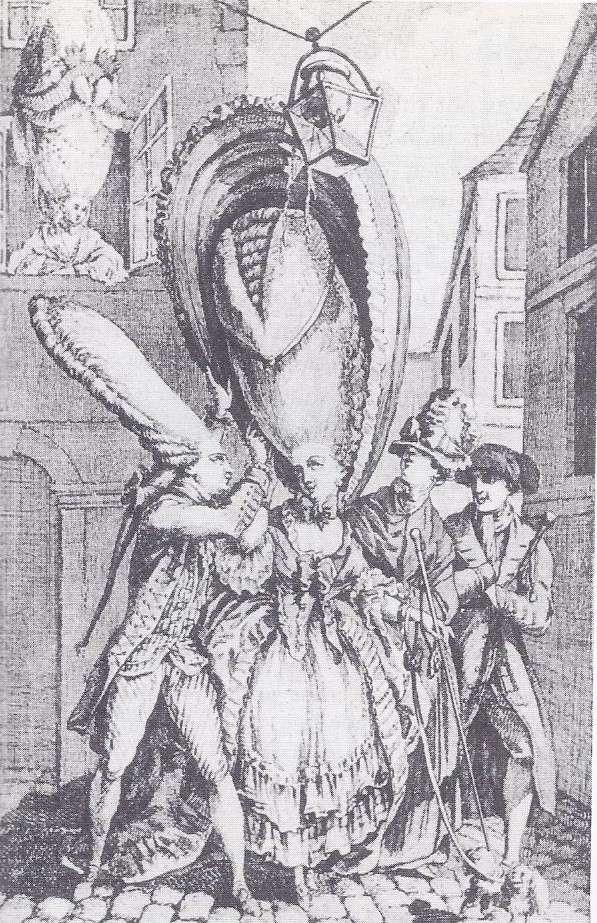
Prisons were dark, unheated, unsanitary dungeons. One of the most widely known was the grim Bastille in Paris. Prisoners condemned for serious crimes were sometimes sentenced to the terrible, grinding work of pulling an oar in the galleys. The hands of convicted pickpockets might be chopped off. Executions were common and condemned criminals were often put to death in cruel ways.
Nobles retained their special privileges. Although Richelieu, Mazarin and Louis XIV took away power from the French nobles, they left them many of their old privileges. Not only were noblemen to a large extent free of taxes that the common people had to pay, but as landlords the nobles had special privileges that brought them money.
The landlord owned the village bake ovens, the wine press where the grapes were pressed, the mill where the grain was ground, the blacksmith shop where metal implements were made and repaired, the fishpond and the forest where firewood was cut. People in the village had to pay the prices he set to use these facilities.
In addition, landlords sometimes had the right to send their goods to markets fast. Of course the landlords in such cases received the best prices. The nobles also had the right to hunt on the peasants’ land, even if their hunting destroyed the crops. The peasants were not to complain, nor were they permitted to kill animals that injured their crops or carried off their livestock. “The proper attitude for the poor,” said the wife of a French duke in the 1600’s, “is one of meekness, coupled with a proper gratitude for the charity of the rich.”
In the old days when the feudal nobles actually ruled their manors and risked their lives to defend the villagers against attack, many peasants hated them but respected them. In the 1700’s, however, the common people began to ask themselves, “What are these gilded butterflies at Versailles, these men for whom life is one long round of pleasure doing to earn so many privileges?”
It was not that the French people were worse off than others in Europe. As a matter of fact, conditions in many parts of Europe were far worse than in France. The decline of serfdom, the growth of manufacture, the rise of commerce and the increased number of common people holding positions in the government were proof that ordinary folk could sometimes get ahead. The fact that the French people continued to be subject to outworn feudal customs caused great discontent.
